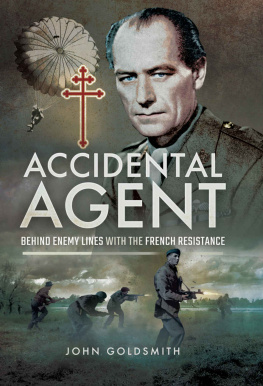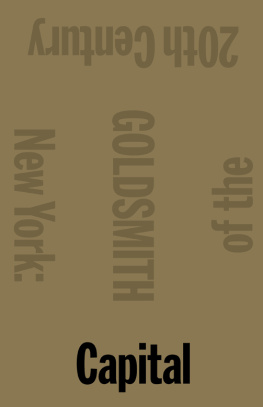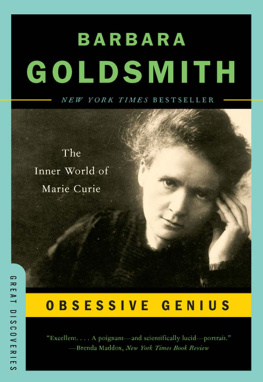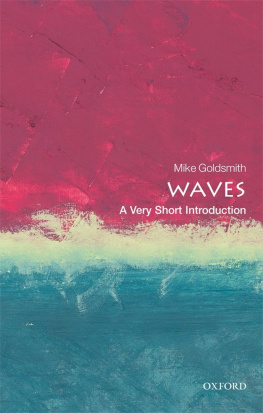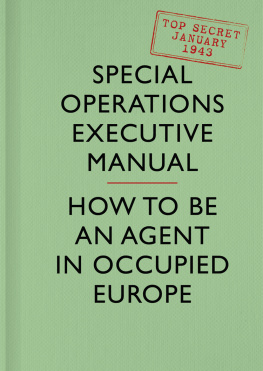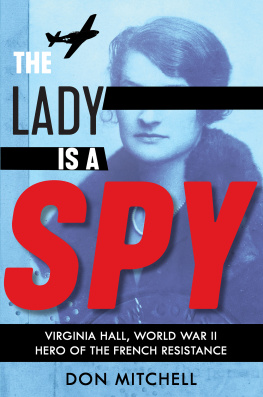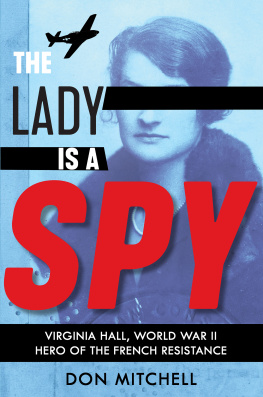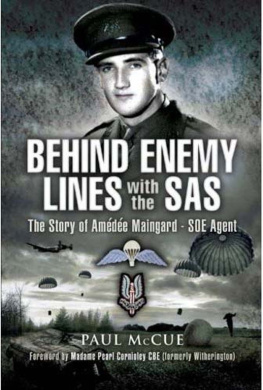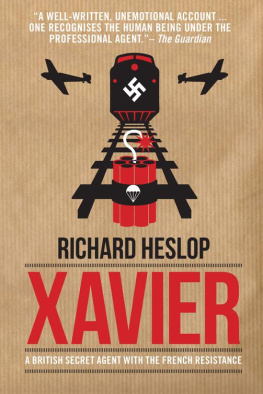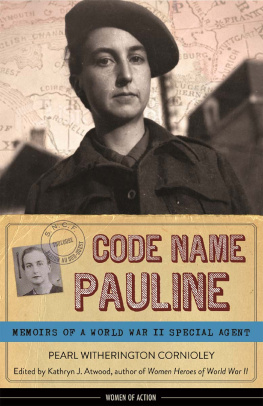Goldsmith - Accidental Agent: Behind Enemy Lines with the French Resistance
Here you can read online Goldsmith - Accidental Agent: Behind Enemy Lines with the French Resistance full text of the book (entire story) in english for free. Download pdf and epub, get meaning, cover and reviews about this ebook. year: 2017, publisher: Pen and Sword, genre: Non-fiction. Description of the work, (preface) as well as reviews are available. Best literature library LitArk.com created for fans of good reading and offers a wide selection of genres:
Romance novel
Science fiction
Adventure
Detective
Science
History
Home and family
Prose
Art
Politics
Computer
Non-fiction
Religion
Business
Children
Humor
Choose a favorite category and find really read worthwhile books. Enjoy immersion in the world of imagination, feel the emotions of the characters or learn something new for yourself, make an fascinating discovery.
- Book:Accidental Agent: Behind Enemy Lines with the French Resistance
- Author:
- Publisher:Pen and Sword
- Genre:
- Year:2017
- Rating:5 / 5
- Favourites:Add to favourites
- Your mark:
- 100
- 1
- 2
- 3
- 4
- 5
Accidental Agent: Behind Enemy Lines with the French Resistance: summary, description and annotation
We offer to read an annotation, description, summary or preface (depends on what the author of the book "Accidental Agent: Behind Enemy Lines with the French Resistance" wrote himself). If you haven't found the necessary information about the book — write in the comments, we will try to find it.
Accidental Agent: Behind Enemy Lines with the French Resistance — read online for free the complete book (whole text) full work
Below is the text of the book, divided by pages. System saving the place of the last page read, allows you to conveniently read the book "Accidental Agent: Behind Enemy Lines with the French Resistance" online for free, without having to search again every time where you left off. Put a bookmark, and you can go to the page where you finished reading at any time.
Font size:
Interval:
Bookmark:

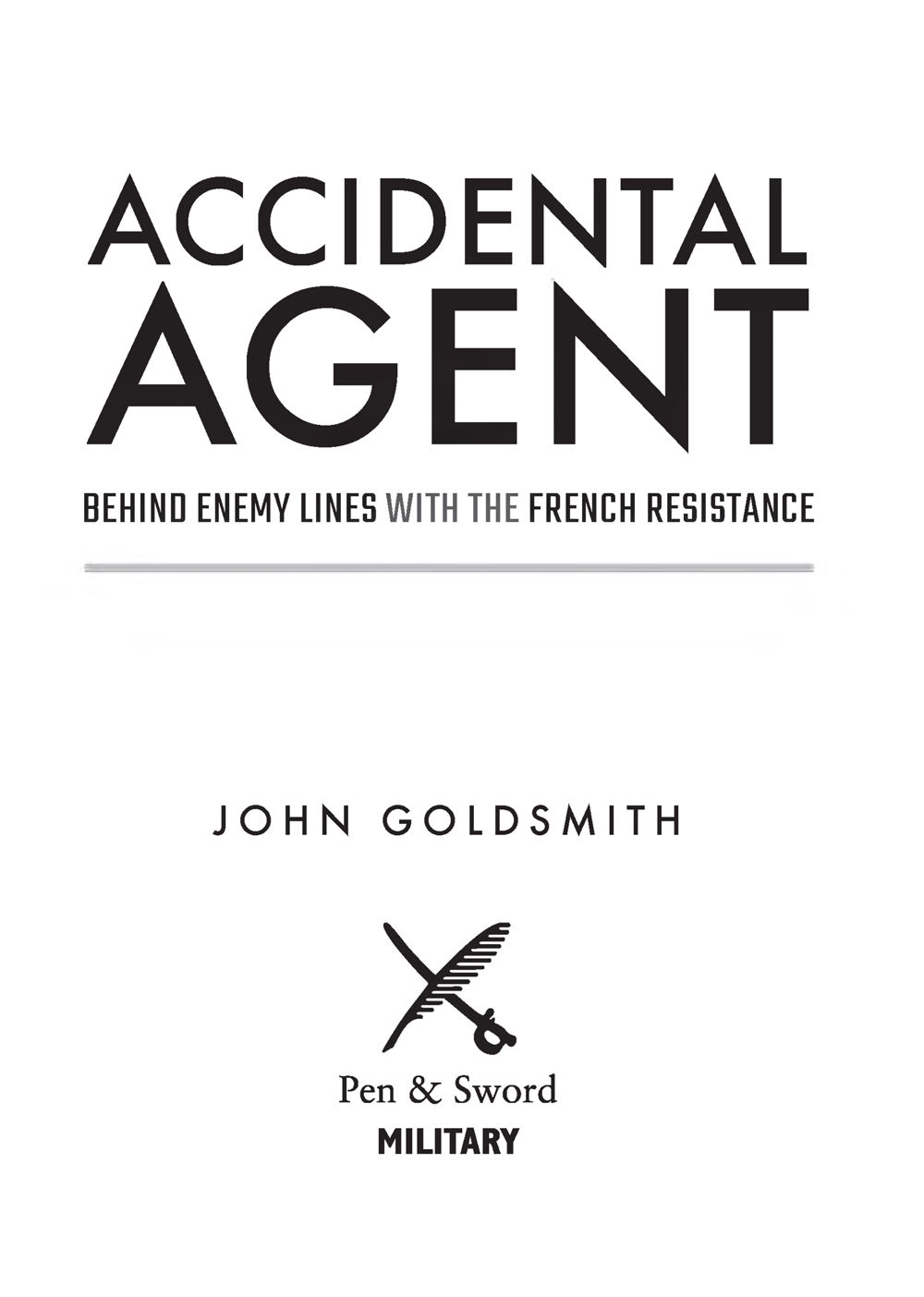
First published in Great Britain in 1971 by Leo Cooper
Reprinted in this format in 2016 by
Pen & Sword Military
An imprint of
Pen & Sword Books Ltd
47 Church Street, Barnsley
South Yorkshire
S70 2AS
Copyright The Estate of the Late John Goldsmith, 2016
ISBN 978 1 47388 781 7
The right of John Goldsmith to be identified as Author of this work has been asserted by him in accordance with the Copyright, Designs and Patents Act 1988.
A CIP catalogue record for this book is available from the British Library
All rights reserved. No part of this book may be reproduced or transmitted in any form or by any means, electronic or mechanical including photocopying, recording or by any information storage and retrieval system, without permission from the Publisher in writing.
Printed and bound in England
By CPI Group (UK) Ltd, Croydon, CR0 4YY
Pen & Sword Books Ltd incorporates the Imprints of Pen & Sword Aviation, Pen & Sword Family History, Pen & Sword Maritime, Pen & Sword Military, Pen & Sword Discovery, Pen & Sword Politics, Pen & Sword Atlas, Pen & Sword Archaeology, Wharncliffe Local History, Leo Cooper, Wharncliffe True Crime, Wharncliffe Transport, Pen & Sword Select, Pen & Sword Military Classics, The Praetorian Press, Claymore Press, Remember When, Seaforth Publishing and Frontline Publishing
For a complete list of Pen & Sword titles please contact
PEN & SWORD BOOKS LIMITED
47 Church Street, Barnsley, South Yorkshire, S70 2AS, England
E-mail:
Website: www.pen-and-sword.co.uk
Family Introduction
John Goldsmith was a larger than life character. Charismatic, with a great sense of humour, he had a ridiculously infectious laugh, which sounded as if he was about to have a seizure. He was tremendous fun and loved to entertain. Any success had to be celebrated, no matter how small, and he would find any excuse for a party. A great raconteur with a keen interest in people and hearing what they had to say, he was an attentive listener. With a studied gaze he always made you feel he was hanging on your every word.
Although he left school as soon as conceivably possible, he had a tremendous thirst for knowledge on any subject whatsoever. Travelling the length and breadth of the country to race meetings, it amused him to point out obscure and random facts along the way. A keen cricketer, he organised a local pub team to take on The Lords Taverners along with his friend Gilbert Harding, the radio and TV personality. After one unsuccessful day at the races, he and Gilbert once dined on kippers and red wine; they claimed it was all they could find in the larder at the time.
He also enjoyed playing tennis at the home of his sister-in-law Monica, whose maiden name was Ricketts, the 1935 Argentine Open Tennis Champion. He didnt suffer fools gladly but had an extraordinary patience with animals. His edict no animal is untrainable led him to rescue dogs on numerous occasions. The family pets came in all shapes and sizes from large Alsatian to miniature Dachshund. He had less patience with people but, if you were liked by him, then he had all the time in the world for you.
For many years we knew nothing of what happened during the war. He was just happy to get on with training racehorses, which he did successfully both in France and England; narrowly beaten in the Grand National, he trained over 400 winners. The war was a closed subject which, if it was ever raised, he would simply dismiss as water under the bridge. Fortunately, he changed his mind as he became increasingly frustrated watching agents on television constantly behaving in ways that never happened. So he decided to set the record straight with his memoir, Accidental Agent. We, his family, and others who read this were enthralled not just by his extraordinary experiences but the completely honest manner in which he described them.
We are delighted that Pen and Sword have agreed to re-publish his story and we hope that, as a result, many others will be able to read and enjoy this typically modest, yet thrilling, account of his contribution during that turbulent period.
September 2016
Have you ever felt that your memory is playing tricks on you? I began to have that feeling a few months ago when watching yet another of the never-ending T.V. films about a British agent in Nazi-occupied France during the war.
I couldnt remember drinking interminable cups of coffee in gay cafs. It was like gold dust, surely. Wine too. That was on the ration when you could get it. Wasnt it? As for the casual handing-over of secret messages in the street, that wasnt in the training manuals of Special Operations Executive in my day. Or was it? One thing in particular rang false the apparent universal comradeship of Resistance fighters throughout France and their undivided loyalty to General de Gaulle. Even after twenty-five years I couldnt swallow that.
I began to look up the many books that have been written on the subject. I checked old correspondence. And memories that had lain buried under a quarter of a century devoted to training racehorses came reluctantly to life, not all of them pleasant ones. I jotted down one or two notes and finally, after I retired from racing, I went back on a trail that had been cold since the war ended.
I even persuaded Bill Moore, a hardened Fleet Street journalist, specializing in investigation, to help my research and dragged him protesting around the back streets of Paris and the dusty lanes of Provence. The result: I was satisfied that those sometimes humdrum, sometimes desperate, hungry and cruel days were fact. The celluloid world of the T.V. screen was mainly fiction. After listening to me pontificate for the umpteenth time Bill Moore said: Everyone else has written a book about it. Why dont you ? Then we can all have some peace.
This, then, is the result, a result that would never have been achieved, without the unfailing and untiring help and guidance of Bill Moore, to whom much of the credit is due.
JOHN GOLDSMITH
August 1970
O N a scorching day in August 1944 I found myself crouching under the shade of a withered olive tree on the parched slopes of Mont Ventoux about thirty miles or so from Avignon. For once the sky of Provence was not its renowned clear blue. At least not over the mountain, which was shrouded in a dirty brown haze that smelled of charred twigs, cordite, melting rubber and dust lots of dust. In my imagination it seemed to reek of Germans too, a sour odour of sweaty tunics and stale cigars. As, at that moment, they were cascading down the hillside, in terror-stricken flight, this was hardly surprising. Had I been on their side I would have run too. From my position on a little ridge I could see the maquis scrambling purposefully after the fleeing Master Race. Mixed up with the hard shouts of the Germans came the excited jabbering of victorious Frenchmen. From time to time, as a Nazi group was cornered in the narrow ravine of the sunken road down which they were retreating, the steady crack of rifles accelerated to a fusillade, followed by prolonged bursts of automatic fire, yells, screams and the occasional boom of a grenade. Grenades, I had just discovered, were highly effective in this form of combat. Among the maquisards, or Resistance fighters, crouching near me in the thorny bushes, was a youngster wearing an ancient steel helmet that could have belonged to his grandfather. He was handling a Sten gun with impressive efficiency. Behind him squatted two swarthy peasants, in shirt sleeves, who fired long rifles every few minutes and, by some miracle, talked and smoked incessantly at the same time.
Next pageFont size:
Interval:
Bookmark:
Similar books «Accidental Agent: Behind Enemy Lines with the French Resistance»
Look at similar books to Accidental Agent: Behind Enemy Lines with the French Resistance. We have selected literature similar in name and meaning in the hope of providing readers with more options to find new, interesting, not yet read works.
Discussion, reviews of the book Accidental Agent: Behind Enemy Lines with the French Resistance and just readers' own opinions. Leave your comments, write what you think about the work, its meaning or the main characters. Specify what exactly you liked and what you didn't like, and why you think so.

